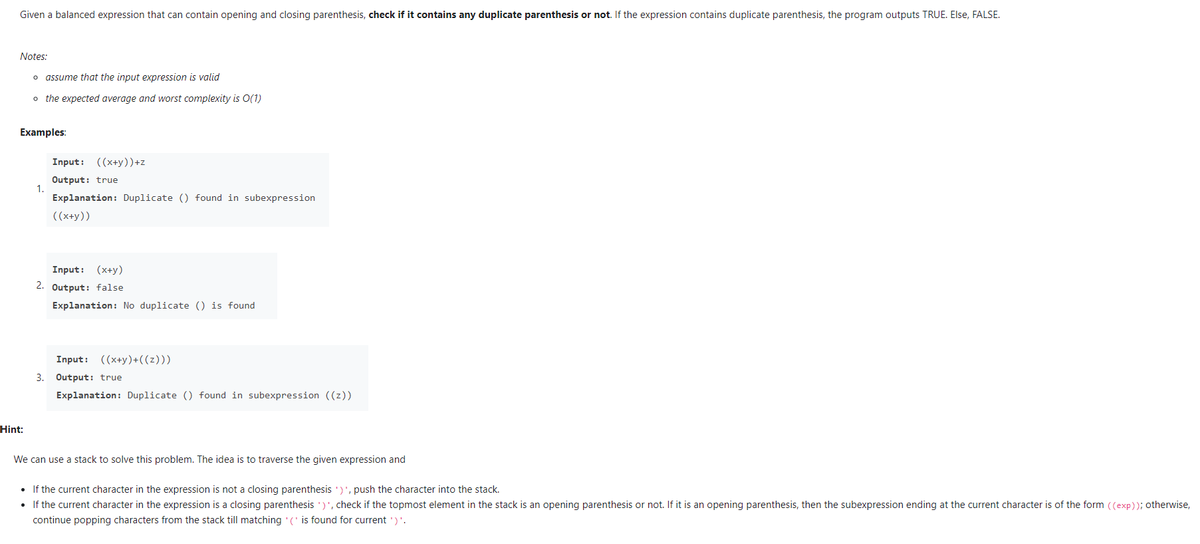iven a balanced expression that can contain opening and closing parenthesis, check if it contains any duplicate parenthesis or not. If the expression contains duplicate parenthesis, the program outputs TRUE. Else, FALSE.
iven a balanced expression that can contain opening and closing parenthesis, check if it contains any duplicate parenthesis or not. If the expression contains duplicate parenthesis, the program outputs TRUE. Else, FALSE.
Database System Concepts
7th Edition
ISBN:9780078022159
Author:Abraham Silberschatz Professor, Henry F. Korth, S. Sudarshan
Publisher:Abraham Silberschatz Professor, Henry F. Korth, S. Sudarshan
Chapter1: Introduction
Section: Chapter Questions
Problem 1PE
Related questions
Question
PYTHON: STACKS

Transcribed Image Text:Given a balanced expression that can contain opening and closing parenthesis, check if it contains any duplicate parenthesis or not. If the expression contains duplicate parenthesis, the program outputs TRUE. Else, FALSE.
Notes:
o assume that the input expression is valid
o the expected average and worst complexity is O(1)
Examples:
Input: ((x+y))+z
Output: true
1.
Explanation: Duplicate () found in subexpression
((x+y))
Input: (x+y)
2. Output: false
Explanation: No duplicate () is found
Input: ((x+y)+((z)))
3. Output: true
Explanation: Duplicate () found in subexpression ((z))
Hint:
We can use a stack to solve this problem. The idea is to traverse the given expression and
• If the current character in the expression is not a closing parenthesis ')', push the character into the stack.
• If the current character in the expression is a closing parenthesis ')', check if the topmost element in the stack is an opening parenthesis or not. If it is an opening parenthesis, then the subexpression ending at the current character is of the form ((exp)); otherwise,
continue popping characters from the stack till matching (' is found for current ')'.
Expert Solution
This question has been solved!
Explore an expertly crafted, step-by-step solution for a thorough understanding of key concepts.
Step by step
Solved in 4 steps

Knowledge Booster
Learn more about
Need a deep-dive on the concept behind this application? Look no further. Learn more about this topic, computer-science and related others by exploring similar questions and additional content below.Recommended textbooks for you

Database System Concepts
Computer Science
ISBN:
9780078022159
Author:
Abraham Silberschatz Professor, Henry F. Korth, S. Sudarshan
Publisher:
McGraw-Hill Education

Starting Out with Python (4th Edition)
Computer Science
ISBN:
9780134444321
Author:
Tony Gaddis
Publisher:
PEARSON

Digital Fundamentals (11th Edition)
Computer Science
ISBN:
9780132737968
Author:
Thomas L. Floyd
Publisher:
PEARSON

Database System Concepts
Computer Science
ISBN:
9780078022159
Author:
Abraham Silberschatz Professor, Henry F. Korth, S. Sudarshan
Publisher:
McGraw-Hill Education

Starting Out with Python (4th Edition)
Computer Science
ISBN:
9780134444321
Author:
Tony Gaddis
Publisher:
PEARSON

Digital Fundamentals (11th Edition)
Computer Science
ISBN:
9780132737968
Author:
Thomas L. Floyd
Publisher:
PEARSON

C How to Program (8th Edition)
Computer Science
ISBN:
9780133976892
Author:
Paul J. Deitel, Harvey Deitel
Publisher:
PEARSON

Database Systems: Design, Implementation, & Manag…
Computer Science
ISBN:
9781337627900
Author:
Carlos Coronel, Steven Morris
Publisher:
Cengage Learning

Programmable Logic Controllers
Computer Science
ISBN:
9780073373843
Author:
Frank D. Petruzella
Publisher:
McGraw-Hill Education